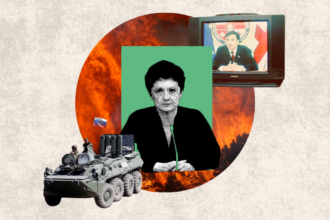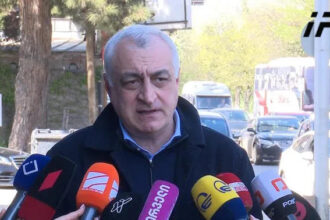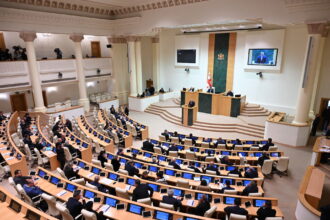On October 9, the European Parliament passed a resolution on “Democratic backsliding in Georgia and threats to its political pluralism” with 495 votes for, 73 against, and 86 abstentions.
The resolution, among other things, calls for a freezing of EU funds for the Georgian Government until it repeals anti-democratic laws, for sanctions against Georgian Dream Honorary Chairman BidzinaIvanishvili and for an evaluation of Georgia’s compliance with visa liberalization benchmarks. It calls for “strict restrictions to be placed on any future funding to Georgian Government.”
The resolution also focuses on the upcoming elections for the Georgian parliament and reaffirms the “unwavering” support of the EU to the people of Georgia, and their European aspirations.
Key Provisions
The resolution calls for the freezing of all EU funding until undemocratic legislation is repealed. This includes the Foreign Agents Law as well as the anti-LGBT laws. It condemns the mentioned laws and regrets “Georgia’s democratic backsliding for a considerable time.”
The resolution calls on the European Commission again to assess the impact that Georgia’s actions – including the adoption of antidemocratic legislation – have on the country’s ability to continue meeting the benchmarks for visa liberalization, in particular, the benchmark of fundamental rights, which is highlighted as a key component of the EU visa liberalization policy.
The resolution calls Bidzina, the honorary chair of the ruling party an “oligarch”, and condemns his role in Georgia’s political crisis, and in another attempt to undermine Georgia’s Euro-Atlantic stance in favor of a pivot towards Russia. The European Parliament calls on the European Council, the EU’s democratic allies and Bidzina Ivanishvili to “impose immediate and targeted sanctions on Ivanishvili” for his role in the deterioration in the political process of Georgia.
The European Parliament also calls on the EU to “hold accountable and impose sanctions on all those who are responsible for undermining the democracy in Georgia and who are complicit in violence against political opponents, peaceful protesters, and who spread anti Western disinformation.”
The European Parliament expressed “deep concern” over the increased influence of Russia in Georgia, including increased immigration from Russia, and increased trade ties. It also called on the Georgian Government “to impose sanctions on Russia as a response to its war against Ukraine.” They also asked the government to “continue its previous policy of not recognising the occupied territory and honor its commitment of enforcing effective measures to prevent the circumvention of European sanction.”
The resolution reiterates its “urgent” demand for the “immediate, unconditional and unconditional” release Georgian ex president Mikheil Sakaashvili to allow him to seek medical treatment abroad.
The October Elections
The resolution calls on the Georgian authorities “to ensure that the October parliamentary election meets the highest international standards, and is held in a fair, transparent, and free manner to reflect the will and the people.” The European Parliament urges Georgian officials “to take all measures necessary to ensure that all respected organizations in civil society involved in election monitoring can observe these elections without interference or hindrance in their work.”
The resolution also addresses recent attacks on TI-Georgia, and the Vote For Europe movement. It emphasizes that creating obstacles for these groups is an attempt to undermine the democracy in the country. The resolution notes that although the Anti-Corruption Bureau reversed its decision later to declare these two groups as “political players with declared electoral goals” at the government’s request, the initial decision still raises questions about the Bureau’s political neutrality.
The resolution also expresses concern that “despite numerous demands from the Georgian Diaspora,” only limited numbers of polling stations abroad will be opened for Georgian emigrants in order to exercise their right as voters without hindrance.
The resolution condemns Georgian Dream for using images of Ukrainian war “as a way to manipulate opinions and spread disinformation, pro-Russian sentiment and anti-Ukrainian feelings in its campaign.”
The resolution calls on Georgian Dream to respect and honor the will of the Georgian people and ensure a “peaceful transition of power” in the elections. It also calls for GD leaders to stop violence, intimidation and hate speech as well as repression of the opposition, civil societies, and independent media.
The European Parliament “strongly believe that the upcoming election will be decisive for Georgia‘s future democracy and geopolitical choices, as well as its ability to progress with its EU Member State Candidacy; recognizes that there is still time to consolidate Georgia’s democratic future as a candidate country to the EU with a younger, engaged generation of leadership, which was exemplified in the spontaneous protests that took place against the Foreign Agent Law during 2024.”
The resolution also reiterates the Council’s unwavering commitment to the people of Georgia, and their European aspirations. The resolution emphasizes that last year, the European Council granted Georgia candidate status in order to recognize the achievements and democratic efforts made by Georgia’s civil societies, as well as to acknowledge the overwhelming support of its citizens for EU accession, with more than 80% consistently in favor.
The European Parliament’s Resolutions are not legally binding, but their recommendations may be taken into consideration by EU decision makers.
Shalva Papuashvili, the Speaker of the Georgian Parliament, condemned the draft even before it was adopted. He called it “outrageous,”‘shameful, and ‘disgusting’ for its calls for sanctions to be imposed against Bidzina Papuashvili, sanctions against Russia, and the release former President Mikheil Sakaashvili.
MEPs ask HR/VP Borrell to impose targeted sanctions against MPs if the Agents’ Law is adopted
MEPs call for suspension of Georgia’s EU Candidate status
Read More @ civil.ge




